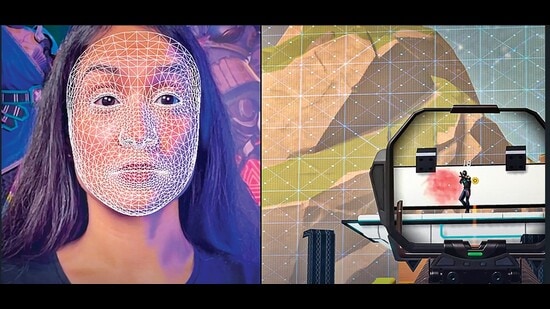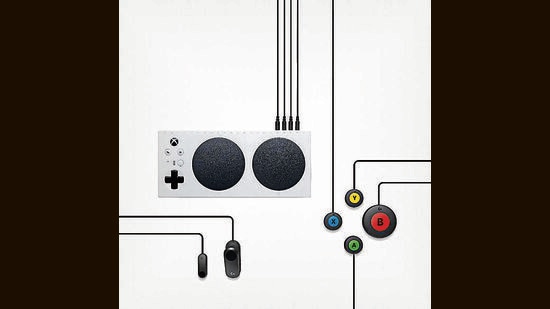
Smile to take the next leap: Games are adapting further for the differently abled
8 months ago | 89 Views
MaskGun, released by the Indian developer SuperGaming in 2019, wasn’t designed to be inclusive.
But in 2021, co-founder and CEO Roby John received an email that changed a lot for his company. A player in her late-20s wrote in from Michigan to say that she had a leg amputated following an accident, and MaskGun — a game of secret agents, snipers and more — had kept her going during her recovery.
The email got John thinking about what it might be like for a differently abled person to try to immerse themselves in an imagined world of action and adventure. And in June last year, the Pune company tied up with Google’s Project Gameface, to offer new features that would allow differently abled people to play more easily.
When Indus: Indo-Futuristic Battle Royale is released later this year, it will allow players to use gestures to play: raise their eyebrows to click or drag, twist the mouth to move a cursor. “The aim is to have no player left behind,” John says.

While subtitles and audio descriptions have been helping aid gameplay for years (since Apple’s VoiceOver screen reader premiered in 2009, in fact), and while these features are thankfully improving, new ones such as the gesture controls allow gamers with far greater variability in movement to join in.
In May, for instance, the first-person shooter game XDefiant by Ubisoft announced that players could now toggle to crouch, slide and sprint (rather than use a complicated combination of manual controls), while the actions of reloading or switching weapons, and grabbing onto ledges, could be made automatic.
The latest instalment of the fighting game Mortal Kombat, MK 1, released in September, offers lush soundscapes for the sight-impaired. Subtitles describe the actions of background characters too. And for players using audio descriptions, the voices aren’t sterile and robotic but expressive and often funny.
Popular games such as The Last of Us Part II (2020), Sea of Thieves (2018) and The Sims 4 (2014) have incorporated similar features. Additional aids are available if one plays via gaming consoles such as the Xbox Adaptive Controller, launched in 2018.
New realms
Now to step back a bit. Of all the battles being fought by the differently abled, how much of a priority should this one be?
“The world we inhabit today is not just a physical world but also a digital one. So it’s important that everyone, including people with disabilities, can inhabit both,” says gender rights and disability activist Nidhi Goyal, 38. “There is still so much struggle in just realising basic rights enshrined in the law that other things fall by the wayside. But we too need access to recreation.”
In the pandemic, for instance, Goyal adds, she and her then-boyfriend-now-husband Apoorv Kulkarni, 37, a research head with an inclusivity think tank, were separated in the lockdown and spent hours connecting over accessible videogames.
Virtual playgrounds should be accessible, just as real-world ones should be, she says. Simple things like making sure descriptions don’t overlap with subtitles make it possible for everyone to come together on the same platform, and that matters, as it always has.

Pixel power
Over and over, lived experience is catalysing the shift, underlining the difference that such access can make.
In California, in 2005, 14-year-old Arman Nobari found comfort in playing the fantasy real-time strategy game Warcraft III, while battling a Stage 3 lymphoma. He realised the limitations of the game when his friends in hospital with vision or mobility issues tried to join him and couldn’t.
This experience stayed with him and, as a user-experience designer with Google, he became an advocate for accessibility.
In 2018, he decided to do more, and co-founded Vault Labs, an agency that sought to help apps and websites cater more adequately to the differently abled. Before it could take off, Nobari suffered a setback. “A tumour in the front of my brain ruptured while I was on a flight, which caused partial facial paralysis, and I had to get a craniotomy,” he says.
Now 33, he is starting afresh, with Good Trouble Games, which he co-founded last year. Its first offering will be a real-time strategy (RTS) game with accessibility at the forefront.
The biggest problem with RTS, Nobari says, is that a simple slip or a single inaccurate click can cause one’s gameplay to fall apart. For many differently abled players, this is a big barrier to entry, and he wants to take it down. Players may look to the Microsoft car-racing game Forza Motorsport (2023) for clues on what such a shift might look like, he says.
That game uses aural and sonar cues such as bleeps, bloops and poings to help players assess how they are faring, and better manoeuvre their car. The interface is seamless for those who do not need the cues, and it ensures that those who do need them can enjoy the game just as well.
“Accessibility cannot be an afterthought. It needs to be integrated from the start, to make a game seamless and intuitive for a wider range of players,” Nobari says. And it often isn’t very hard to do. Gaming is all about: Will this work? Well, take that a step further, he recommends, “by asking simple and thoughtful questions such as: Can this game be played easily with one hand, especially a non-dominant one?”
Read Also: word famous: vikas swarup of q&a / slumdog millionaire, discusses his new book




















